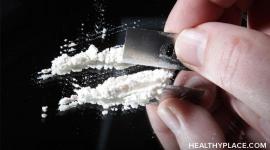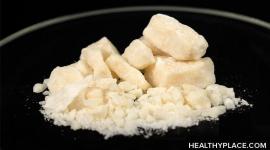Cocaine Dependence and Is Cocaine Addictive?

When considering, "is cocaine addictive?" it's worth knowing cocaine increases the amounts of several pleasure chemicals in the brain. Cocaine is also associated with creating positive reinforcement biochemically in the brain. According to the National Institute on Drug Abuse, 10% of those who start using cocaine go on to heavy use.1
Cocaine is the second most abused stimulant drug, behind nicotine, making cocaine dependence and cocaine addiction common. Cocaine is also the number one drug involved in emergency room visits, also indicating how dangerous and addictive cocaine is.2
Cocaine has been shown as the most addictive drug in animals and humans react similarly. Cocaine addicts commonly do things completely out-of-character to obtain cocaine.
Is Cocaine Addictive? What is Cocaine Dependence?
Cocaine dependence is not the same thing as cocaine addiction. Cocaine dependence specifically involves becoming tolerant to the effects of cocaine and developing withdrawal symptoms when cocaine use stops.
Cocaine dependence is a development of:
- Tolerance to cocaine: more cocaine is required to obtain the same effect
- Withdrawal symptoms: psychological, physical or both, which occur when cocaine use stops. Cocaine withdrawal symptoms can include agitation, anxiety and psychosis.
Many people who develop cocaine dependence go on to become cocaine addicts. The risk of cocaine dependence within the first two years of use is about 5% - 6% and the risk of cocaine dependence in the first ten years is 15% - 16%. Smoking cocaine increases the risk of cocaine dependence and injecting cocaine increases the risk further.3
Is Cocaine Addictive? What is Cocaine Abuse?
Cocaine addiction is also known as cocaine abuse. When considering, "is cocaine addictive?" it's important not to confuse addiction with cocaine dependence. Cocaine dependence is a physical or psychological dependence on the drug, but cocaine addiction requires the individual continue using cocaine despite harmful consequences to themselves and others. Cocaine addiction also often involves illegal or harmful actions to afford the drug.
Facts about cocaine addiction include:4
- People with cocaine addiction have had their brain chemistry altered by cocaine
- Cocaine addiction is a mental illness that requires treatment
- Cocaine addicts cannot quit on their own
- Cocaine addiction often leads to use of free base cocaine or crack cocaine
- A family history of addiction creates greater risk in finding cocaine addictive
- About 50% of people who abuse illicit drugs also have a mental illness5
Cocaine is considered highly addictive and this may partly be due to the fact that after ingesting the drug, the high is almost immediate and is short-lasting, encouraging the user to use more cocaine after the first high is over.
APA Reference
Tracy, N.
(2021, December 15). Cocaine Dependence and Is Cocaine Addictive?, HealthyPlace. Retrieved
on 2026, January 29 from https://www.healthyplace.com/addictions/cocaine-addiction/cocaine-dependence-and-is-cocaine-addictive



